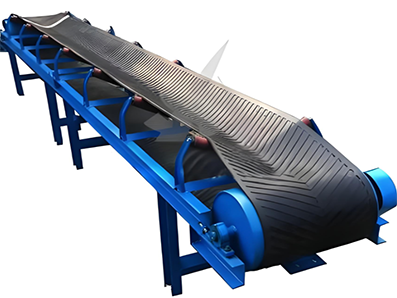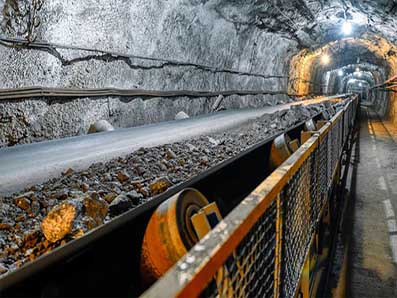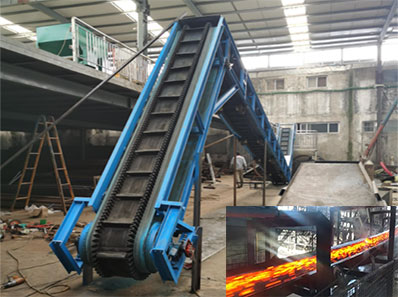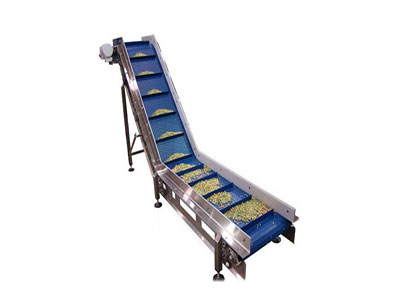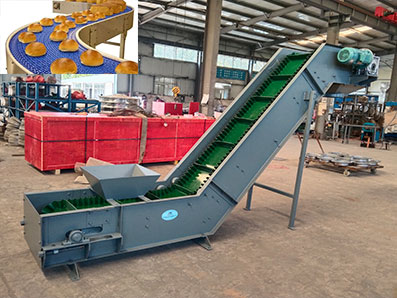
Food grade conveyor belt
Food grade conveyor belts are non-toxic, oil-resistant, corrosion-resistant, easy to clean, and meet food safety standards.
Length: 1-50 meters (customizable)
Width: 100-2000 mm (customizable)
Angle: 0-30° for flat belts, up to 90° for sidewall belts
Material: PU/PVC/Silicone/PE/FDA rubber, oil- and high-temperature resistant
Applications: Baking, meat processing, fruit and vegetable sorting and packaging, meeting food safety standards
Food Grade Conveyor Belt Overview
Food grade conveyor belt are conveyor belts used in food processing, packaging, and transportation. They typically range in length from 1 meter to over 50 meters, with widths ranging from 100 mm to 2000 mm, depending on food size and conveying volume. Conveyor belts offer angles from 0° to 90°, and can transport weights ranging from 10–50 kg/m. They are available in various materials, including wear-resistant and oil-resistant PU conveyor belts, economical PVC conveyor belts, high-temperature silicone conveyor belts, lightweight PE/PP conveyor belts, and stainless steel mesh belts suitable for high-temperature or breathable applications. All belts meet food safety standards.
Food grade conveyor belts can be configured horizontally, inclined, or Z-shaped to suit different working conditions, based on distance and required output. Horizontal conveying is suitable for scenarios requiring high material stability and long conveying paths. Inclined conveying is suitable for achieving height lifting within limited space; the angle can be adjusted according to material characteristics to ensure no slippage or accumulation. Z-shaped conveying allows for flexible transitions between complex workstations, enabling combined conveying of vertical drops and directional changes.
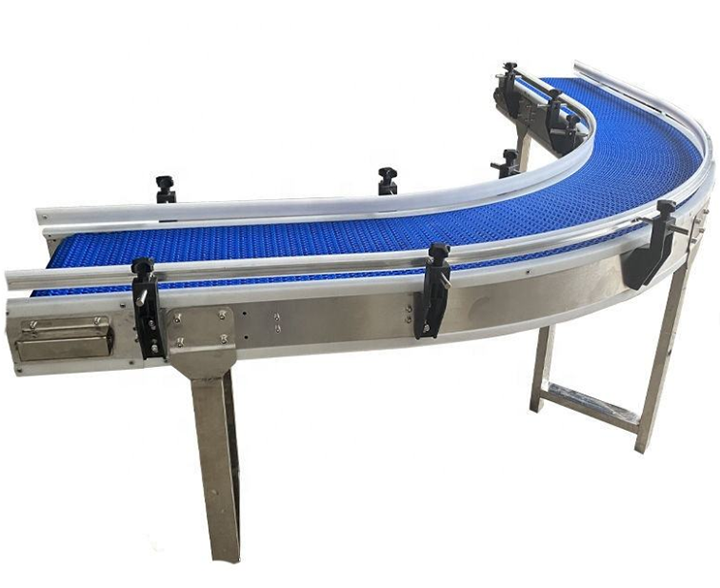
Advantages of Food Grade Conveyor Belts
Food-grade conveyor belts typically comply with FDA and EU 1935/2004 standards for food contact materials, possessing non-toxic, odorless, and mold-resistant properties, effectively reducing the risk of cross-contamination during food processing and transportation. Their smooth surface minimizes food residue residue and withstands high-temperature cleaning and sterilization, ensuring hygienic production. Furthermore, these conveyor belts are resistant to chemical corrosion and high temperatures, resisting detergent corrosion and adapting to a wide temperature range from cold chain low temperatures to baking high temperatures, thus extending their service life.
In addition, these conveyor belts have a moderate coefficient of friction, contributing to smooth food transport, reducing slippage and tipping, and improving transport efficiency. Their flexible designs can be customized to suit production line length, width, speed, and product characteristics, and offer various surface textures such as smooth, serrated, or mesh to meet the conveying needs of different foods such as bread, meat, and fruit.
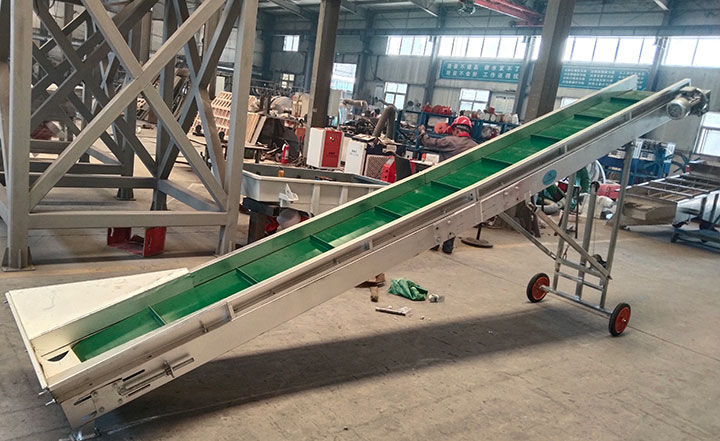
Food Grade Conveyor Belt Product Categories
In food grade conveyor belts PU is the best choice for general, direct food contact; PVC is economical and suitable for packaging lines; silicone offers high-temperature resistance and anti-stick properties, making it suitable for baking; PE/PP is commonly used in modular mesh belts, suitable for low-temperature or bottled beverage applications; and stainless steel mesh belts offer high-temperature resistance and strong load-bearing properties, making them suitable for processes such as frying and drying.
PU (polyurethane) food grade conveyor belts are soft, wear-resistant, cut-resistant, and anti-stick, with high hygienic properties. They comply with FDA and EU 10/2011 food contact safety standards and are non-toxic and odorless. They are oil-, acid-, and alkali-resistant, and highly tear-resistant, making them suitable for direct food contact. They are commonly used in production lines for bakery, pastry, meat, dairy, and fruit processing. They can transport light to medium loads at room or low temperatures and are resistant to common chemical cleaning agents.
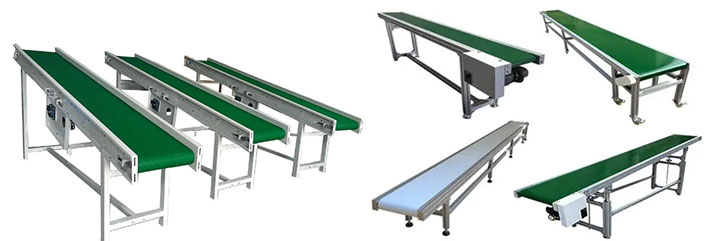
PVC (polyvinyl chloride) food grade conveyor belts are low-cost, lightweight, and easy to install, with a smooth surface. They meet FDA food contact requirements, and some models meet EU standards. However, its wear resistance is average, making it unsuitable for high-temperature or high-oil environments. It is suitable for conveying lightweight packages and is commonly used in biscuits, candies, packaging lines, and bottled foods. It operates under light loads at room temperature and requires moderate cleaning.
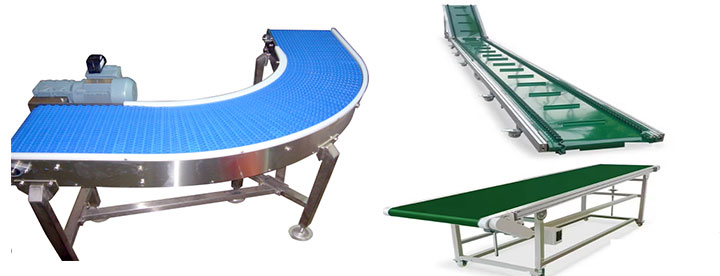
Silicone food grade conveyor belts are heat-resistant, non-stick, flexible, and easy to clean. They meet FDA/EU food contact standards and can withstand temperatures up to 200°C. They are heat-resistant, acid- and alkali-resistant, and have a non-stick surface, making them suitable for high-temperature baking or sterilization applications. They are commonly used in bread and biscuit baking, candy production, and high-temperature sterilization processes. They can contact hot food or undergo steam sterilization in high-temperature environments and have medium loads.
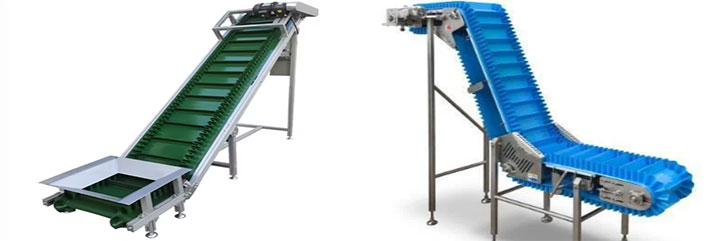
PE (polyethylene) food grade conveyor belts are cold-resistant, have a smooth surface, a low friction coefficient, and are non-toxic and odorless. They meet FDA/EU food safety standards and can be used in direct food contact. Their excellent cold resistance (down to -70°C) and flexibility make them suitable for frozen or low-temperature conveying. They are commonly used in frozen food, seafood, ice cream, and fruit and vegetable processing. They are suitable for conveying light to medium loads in low-temperature or cold chain environments.

PP (polypropylene) Food grade conveyor belt offer high hardness, chemical resistance, strength, and heat resistance, meeting FDA/EU food contact standards and suitable for modular conveying. They are suitable for modular conveying and offer excellent temperature resistance, making them ideal for medium loads and bottled food handling. They are commonly used in beverage bottling lines, canned goods, and frozen food modular conveying. They are suitable for continuous operation in ambient to low-temperature environments and support light to medium load transport.
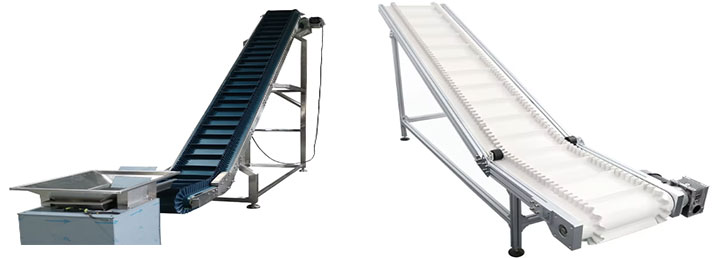
Stainless steel conveyor belts are heat-resistant, corrosion-resistant, load-bearing, and structurally stable. Typically made of 304 or 316 food-grade stainless steel, they meet FDA/EU standards and are easy to clean and disinfect. They are heat-resistant, chemical-resistant, and strong enough to convey heavy objects or high-temperature foods. They are commonly used in meat steaming, frying, baking, high-temperature drying, and cooling tunnels. They can withstand heavy loads and continuous operation in hot and humid environments, making them suitable for industrial-grade processing lines.

Food grade conveyor belt specifications
| Type | Material(s) | Typical Applications | Maintenance Needs | Key Features |
|---|---|---|---|---|
| Food-Grade Belt | PU, PVC, PE | General food handling | Low to moderate | FDA compliant, easy clean |
| Modular Belt | Plastic (PP, PE) | Packaged goods, sorting | Low, easy replacement | Hygienic, modular design |
| Polyurethane Belt | PU | Wet processing, dairy | Low, moisture resistant | Impervious to moisture |
| Wire-Mesh Belt | Stainless steel | Baking, cooling, freezing | Moderate, inspect for wear | High temp, airflow |
| Flat/Cleated Belt | PU, PVC, rubber | Inclines, bulk transport | Moderate, check cleats | Prevents slippage |
| Specialized Conveyors | Varies | Vertical, fragile products | Varies by type | Custom solutions |
Food grade conveyor belt applications
Food grade conveyor belt emphasize material safety, easy cleaning, corrosion resistance, and are non-toxic and odorless, meeting food safety standards. The following are some typical application scenarios: Basic processing in the food processing industry: Meat processing involves cutting, sorting, and conveying beef, pork, and chicken; aquatic processing involves cleaning, sorting, and cold chain transportation of fish, shrimp, and shellfish; fruit and vegetable processing involves washing, peeling, cutting, sorting, and conveying; and in the pastry and baking industry, involves dough conveying, cookie and bread forming, and oven conveying.

Beverage and dairy processing and conveying: Beverage bottling involves conveying bottles or cans to the filling machine. In dairy processing, milk, yogurt, and cheese production lines also rely on conveying to ensure the smooth flow of each production step.
Packaging, sorting, and cold chain logistics: Food grade conveyor belts convey candy, biscuits, and frozen foods before packaging. Sorting systems can automatically sort foods by weight, size, or appearance. Cold chain logistics ensures the transportation of frozen foods from production to storage and transportation, maintaining food quality.
Frozen and quick-frozen food conveying: Frozen food processing encompasses conveying of items such as French fries, frozen vegetables, and quick-frozen seafood. IQF systems are responsible for conveying individual foods after rapid freezing, ensuring the quality and taste of frozen foods.
Other special-purpose conveying: In addition to the common applications mentioned above, there are also specialized conveying applications. Conveyor belts used in baking or steaming equipment ensure stable food transport during the heating and cooking processes. In environments with strict cleanliness and disinfection requirements, such as pharmaceutical and food processing lines, food grade conveyor belts must withstand frequent high-temperature or chemical cleaning to meet hygiene standards.

Food grade conveyor belt supplier
Our factory has extensive experience and technical expertise, enabling us to design and manufacture conveyor belt systems that meet food safety standards, tailored to the specific needs of the food processing industry. We manufacture a wide range of conveyor belt types, including food grade conveyor belts, mining belts, industrial belt conveyors, and Z-belt conveyors. We can also provide customized conveying solutions tailored to specific customer needs, encompassing various materials, sizes, structures, and functional designs.
